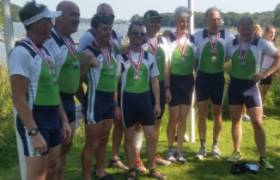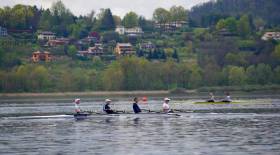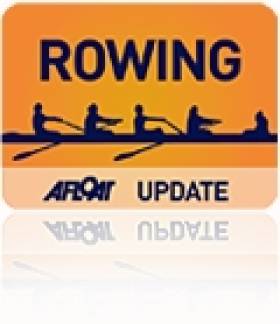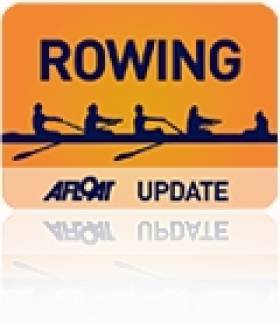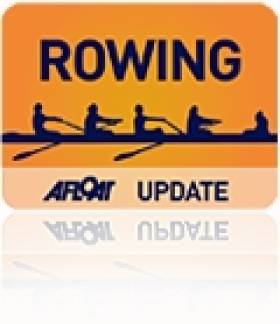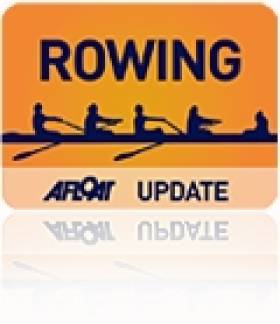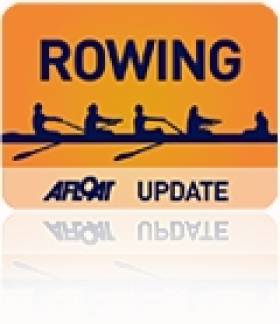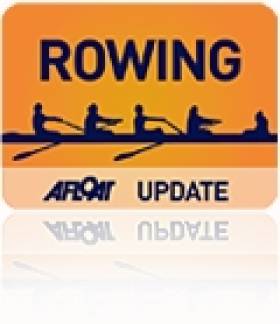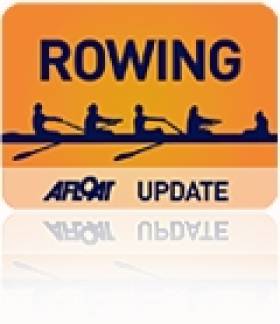Displaying items by tag: pair
Ireland Lightweight Pair Continue Winning Ways
#Rowing: Mark O’Donovan and Shane O’Driscoll won their test race of the lightweight pair at the World Cup Regatta in Poznan, Poland this morning. Britain tested them through three-quarters of the race, but held off when it was clear they would again have to give way to the men in green.
Sanita Puspure and Monika Dukarska finished third and fourth in their heat and missed out on direct qualification in the heats of the women’s single sculls. New Zealand’s Hannah Osborne won a battle with Puspure to take second behind the dominant Vicky Thornley of Britain.
The Ireland pair of Aifric Keogh and Aileen Crowley took fourth in their heat.
Ireland Eight and Pair Win at World Masters Rowing
#Rowing: Ireland had two winners on the first day of the World Masters Rowing Championships in Denmark today. The Ireland composite eight won its race in the E (average age 55 or more) category. They beat German, British, Ukranian, Lithuanian and Turkish crews. The Ireland eight was drawn from Neptune, Commercial, Old Collegians and Belfast Boat Club.
Fran O’Toole and Donal McGuinness, who were part of that crew, won their pairs race in the D category (average age 50 or more).
World Masters Regatta, Copenhagen (Irish interest - Winners; 1,000m)
Men
Eight - E (avg age 55 or more) - Heat Two: Neptune, Commercial, Old Collegians, Belfast Boat Club (J Hudson, D Crowley, G Murphy, M Heavey, D Dickson, C Hunter, F O’Toole, D McGuinness; A Penkert) 3:04.93.
Pair - D (avg age 50 or more) - Heat Three: Commercial (F O’Toole, D McGuinness) 3:26.1.
Jennings and Lambe Bound for C Final at World Cup
#Rowing: The Ireland lightweight double of Sinéad Jennings and Claire Lambe finished fourth in their repechage and are bound for a C Final of the World Cup in Varese in Italy. Italy One and Italy Two battled it out at the head of the field, while Ireland lost a battle for the third qualification spot to Sweden.
The Ireland men’s lightweight four finished fifth in their repechage, rowed as conditions became tougher. The Ireland women’s pair of Leonora Kennedy and Barbara O’Brien also finished fifth in their repechage and also go to a C Final.
World Cup Regatta, Varese (Selected Results, Irish interest)
Men
Lightweight Four – Heat Three (First Two to A/B Semi-Final; rest to Repechages): 1 Italy Two 6:00.40, 2 United States 6:00.95; 4 Ireland (L Seaman, M O’Donovan, L Keane, S O’Driscoll) 6:18.75. Repechage One (First Three to A/B Semi-Finals; rest to C Final): Poland One 6:01.07, 2 Japan One 6:02.92, 3 Poland Two 6:03.41; 5 Ireland 6:14.13.
Lightweight Double Sculls – Heat Three (First Two to A/B Semi-Final; rest to Repechages): 1 Ireland (P O’Donovan, G O’Donovan) 6:27.07, 2 Britain 6:33.38; 3 Netherlands Two 6:48.24.
Women
Pair – Heat One (First Two to A/B Semi-Final; rest to Repechages): 1 Germany 7:23.08, 2 Russia One 7:24.46; 5 Ireland (L Kennedy, B O’Brien) 7:46.38. Repechage Two (First Three to Repechages; rest to C Final): 5 Ireland 7:24.68.
Lightweight Double Sculls – Heat Two (First Two to A/B Semi-Final; rest to Repechages): 1 Switzerland 7:03.98, 2 Canada 7:04.45; 3 Ireland (C Lambe, S Jennings) 7:05.0. Repechage One (First Three to A/B Semi-Finals; rest to C Final): 1 Italy One 6:57.42, 2 Italy Two 6:59.61, 3 Sweden One 7:01.20; 4 Ireland 7:05.60.
Single Sculls – Heat One (Winner to A/B Semi-Finals; rest to Repechages): 1 Ireland (S Puspure) 7:34.32; 2 Czech Republic (M Knapkova) 7:36.13.
Lightweight Single Sculls – Heat One (First Two to A/B Semi-Final; rest to Repechages): 1 Netherlands Two 7:40.25, 2 Italy 7:45.99; 4 Ireland Two (S McCrohan) 8:02.38.
Heat Two (First Two to A/B Semi-Final; rest to Repechages): 1 Canada 7:42.41, 2 Netherlands One 7:45.30; 5 Ireland One (D Walsh) 8:11.91.
Dilleen and Kennedy Take Eighth at World Rowing Championships
#ROWING: Ireland’s Lisa Dilleen and Leonora Kennedy finished second in the B Final of the women’s pair at the World Rowing Championships in Amsterdam today, placing them eighth overall. Russia’s Liana Gorgodze and Elizaveta Tikhanova, the second slowest of the crews in the semi-finals, took this race by storm. They led all the way down the course despite constant attempts to head them by Ireland, the one crew which mounted a consistent challenge.
World Rowing Championships, Day Seven (Irish interest, selected results)
Women
Pair – B Final (Places 7 to 13): 1 Russia (L Gorgodze, E Tikhanova) 7:06.08, 2 Ireland (L Kennedy, L Dilleen) 7:09.20, 3 Serbia 7:10.61, 4 Canada 7:12.15, 5 Ukraine 7:18.40, 6 Czech Republic 7:19.72.
#ROWING: Ireland’s pair of Leonora Kennedy and Lisa Dilleen took fifth in their semi-final at the World Rowing Championships in Amsterdam this morning. The strong United States and New Zealand crews took the first two A Final spots, while Ireland fought it out with Australia’s Charlotte Sutherland and Lucy Stephan for the third, with Serbia also in touch. The Australians eked out a lead of almost three seconds by 1500 metres and got away from the Irish in the final quarter. Serbia edged Ireland into fifth when the third place was gone.
World Rowing Championships, Day Five (Irish interest; selected results)
Women
Pair – Semi-Finals (First Three to A Final; rest to B Final) 1 United States (M Kalmoe, K Simmonds) 7:16.35, 2 New Zealand (L Trappitt, R Scown) 7:22.12, 3 Australia (C Sutherland, L Stephan) 7:30.02; 4 Serbia 7:34.92, 5 Ireland (L Kennedy, L Dilleen) 7:35.18, 6 Czech Republic 7:45.68.
Ireland Pair Withdraws From World Cup Rowing
#ROWING: The Ireland women’s pair of Leonora Kennedy and Lisa Dilleen pulled out of the repechage at the World Cup in Lucerne today because of injury. The race gave them a chance to qualify directly for the A Final, but Kennedy has a sore back and, according to Ireland high performance director Morten Espersen, it would have been unwise for her to compete.
Ireland Pair Qualify for Semi-Finals at World Cup Rowing
#ROWING: Lisa Dilleen and Leonora Kennedy qualified directly for the A/B semi-finals at the World Cup Rowing regatta in Aiguebelette in France this morning. The Ireland crew, which had finished fourth at the European Championships, knew a place in the top three of their heat would be enough to see them through without the need for a repechage. They were in the top three, with Canada and United States Two through the key parts of the race, but it was Canada which finished best to win narrowly from United States Two.
World Cup Regatta, Aiguebelette, France, Day One (Selected Results, Irish interest)
Men
Lightweight Single Sculls – Heats (Time Trials; First Two Directly Through to A/B Semi-Finals; rest to Repechage) – Heat One: 1 China (Tiexin Wang) 7:02.36, 2 France (D Piqueras) 7:07.64; 5 Ireland Two (M O’Donovan) 7:20.78
Heat Three: 1 Ireland One (P O’Donovan) 7:11.34, 2 Britain (Z Lee-Green) 7:15.60.
Women
Pair – Heat Two (First Three to A/B Semi-Finals; rest to Repechage): 1 Canada (N Mastracci, S Grainger) 7:13.29, 2 United States Two (G Luczak, C Lind) 7:13.87, 3 Ireland (L Kennedy, L Dilleen) 7:18.15; 4 Germany Two 7:32.77, 5 China Two 7:37.06.
Pararowing – Arms and Shoulders Men’s Single Sculls – Heat Two (First to A Final; rest to Repechage): 5 Ireland (T Kelly)
#ROWING: Ireland’s Lisa Dilleen and Leonora Kennedy qualified for the A Final of the women’s pair at the European Rowing Championships in Belgrade in Serbia today. The first two boats in this repechage qualified directly and Ireland had taken a clear lead by halfway. Germany, in their own battle for second with the Czech Republic, pushed the Irish in the second half, but Dilleen and Kennedy held on to win by just over a length.
European Rowing Championships, Day Two (Irish interest; selected results)
Men
Lightweight Single Sculls – C/D Semi-Final Two: (First Three to C Final): Croatia 7:10.20, 2 Ireland (P O’Donovan) 7:11.13, 3 Slovakia 7:11.54; 4 Netherlands 7:12.19.
Women
Pair – Repechage Two (First Two to A Final; rest to B Final): 1
Ireland (L Kennedy, L Dilleen) 7:20.36, 2 Germany 7:22.89; 3 Czech Republic 7:24.99, 4 France 7:36.63
Ireland Rowing Pair Qualify for World Under-23 Semi-Finals
#WorldUnder-23Rowing: Ireland took its second good result of the morning as the men’s pair of Seán O’Connor and Fionnán McQuillan-Tolan qualified for the semi-finals with second behind Australia at the World Under-23 Rowing Championships in Linz in Austria.
Angus Moore and Alexander Hill laid down a marker with a stunning win, but there was just one other direct qualification place and the Ireland crew won their battle with Russia for this – they finished over five seconds ahead of the Russians.
World Under-23 Rowing Championships, Day Two (Irish interest, selected results)
Men
Pair – (First Two Directly to A/B Semi-Finals; rest to Repechage) – Heat Two: 1 Australia (A Moore, A Hill) 6:37.37, 2 Ireland (S O’Connor, F McQuillan-Tolan) 6:49.15; 3 Russia 6:54.42, 4 Venezuela 7:05.10, 5 United States 7:09.48, 6 Estonia 7:15.64.
Women
Lightweight Single Sculls – (First Two Directly to A/B Semi-Finals; rest to Repechage) – Heat One: 1 Belgium (E Peleman) 7:46.06, 2 Ireland (D Walsh) 7:50.87; 3 Croatia 7:52.54, 4 Germany 8:00.47, 5 Israel 8:04.22, 6 Argentina 8:06.23.
Ireland Junior Pair Fourth in Pacey World Rowing Semi-Final
# ROWING: The Ireland junior pair of Chris Black and Joel Cassells finished fourth in a pacey semi-final at the World Rowing Championships in Plovdiv in Bulgaria this morning and will compete in tomorrow’s B Final.
The Coleraine men lived with the hot pace until the third quarter, when Germany pushed the Irish out of the third qualification spot in a race dominated by Romania. The big German crew then passed Greece, who had held second, and even threatened Romania at the finish. Romania, Germany and Greece were all inside the time of Hungary, who won the second semi-final.
The Ireland women’s junior quadruple scull of Katie Cromie, Hilary Shinnick, Bridget Jacques and Bernadette Walsh finished found themselves sixth at the end of their B Final (12th overall) after a race in which they reached as high a position as fourth at 1250 metres. Australia and the Czech Republic eventually took fourth and fifth, behind winners Britain, who led in China and Greece.
World Championships, Plovdiv, Bulgaria, Day Four (Irish interest)
Men
Junior Pair – Semi-Final One (First Three to A Final, rest to B Final): 1 Romania 6:43.22, 2 Germany 6:45.36, 3 Greece 6:46.74; 4 Ireland (C Black, J Cassells) 6:50.66, 5 Poland 6:57.67, 6 Belgium 7:49.61.
Women
Junior Quadruple – B Final (Places 7 to 12): 1 Britain 6:42.64, 2 China 6:45.37, 3 Greece 6:47.28, 4 Australia 6:47.80, 5 Czech Republic 6:51.05, 6 Ireland (K Cromie, H Shinnick, B Jacques, B Walsh) 6:52.07.


























